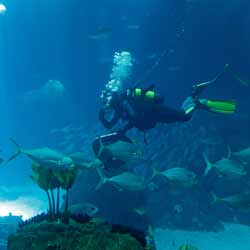Become a Marine Biologist
Most people assume that a marine biologist frolics with dolphins and whales all day, but there is so much more to being a marine biologist that makes it a highly rewarding and complex career choice.
Working with marine life is one of the perks, but a marine biologist is essentially a scientist who has to perform tests and conduct research involving plankton, fish, and other marine organisms, often spending long hours out at sea. A marine biologist is also called an oceanographer and falls under the category of aquatic biologists, of which a limnologist is also part. A limnologist studies fresh water organisms compared to a marine biologist who studies salt water animals, plants and micro organisms. Marine biologists also play a role in marine conservation efforts.

The main focus of a marine biologist is to examine the molecular structures of living organisms in the ocean and also discover certain characteristics about the ocean floor. With the major advancements in biotechnology and genetics nowadays, marine biologists as well as various other types of biologists are able to manipulate cells and molecules to aid health, produce disease resistance, and more. To this end, there have been increases in medical, environmental and agricultural applications.
To become a biologist you have to complete your Bachelor’s degree life sciences and biology with the average annual salary being $33,254 for this level. You can also complete advanced degree biologist programs which include classroom and fieldwork, lab research, and a dissertation. For research positions, a PhD is required which takes about 5 or 6 years to complete full time, with a Master’s degree taking roughly 2 years. Additional disciplines that are helpful in becoming a marine biologist include physics, computer science, engineering, mathematics, and environmental studies.
To become a marine biologist you also have to be a team player, communicating easily and effectively both orally and in writing. Independent work is also required where you will need to have patience and self discipline. Physical fitness is required if you plan on working in the field doing research, but you also need to be business minded and able to perform administrative tasks with ease. Traveling may be required to various seaside locations around the world, as well as out to sea.
With your qualification as a marine biologist, you can start out working for teams of other marine biologists, at aquariums like Seaworld, and for private research companies like Marine Biological Laboratory. With more experience you can end up working for government agencies as a consultant, such as the US Department of the Interior, and leading research teams of technicians and scientists. This will involve learning how to write proposals for research grants from the government.
Marine biologists tend to work the regular 40-hour work week in labs and offices, except when they are on outdoor research assignments which could last a few days and where 24 hours of work may be required at a time.
Quick Marine Biologist Employment Facts
Job Title: Marine Biologist
Office: Laboratories, research boats, aquariums, and out at sea
Description: A marine biologist studies sea life including that of plants, micro organisms, and animals to better understand them and help where necessary in conservation efforts.
Certifications/Education: A Bachelor, Master’s or Doctorate degree is required for various levels of marine biology with additional fields and training sometimes required.
Necessary Skills: You need to be organized and analytical, with knowledge of the environment and the various laws and regulations in place. You need to be a leader and possess excellent communication skills. Additional skills that will help you secure a good job include business management, science, engineering, and physics among other things.
Potential Employers: Seaworld and other aquariums, government agencies, marine research labs and independent marine biologists.
Marine Biologist Salary:
Depending on the type of job and location, a marine biologist can earn between $46,087 and $89,149 including bonuses. Below is a breakdown of the basic salary ranges for various industries you can work in as a marine biologist:
Environmental Research – $40,876 – $66,878
Environmental Consulting – $37,807 – $59,376
Marine Fishing – $34,036 – $56,839
Government – $41,780 – $67,346
Marine Facilities Management and Engineering – $42,797 – $68,307
Helpful Marine Biologist Employment Links:
Search Marine Biologist Jobs on JobMonkey
Hopkins Marine Station of Stanford University Career Information
Marine Bio
Marie Biological Laboratory
Marine Biology Club of the University of Florida
Universities.com (Bachelor Degree in Marine Biology and Oceanography)


 Teach English in Asia
Teach English in Asia  Cruise Ship Jobs
Cruise Ship Jobs  Alaska Fishing Industry Jobs
Alaska Fishing Industry Jobs  Sharing Economy / Gig Economy
Sharing Economy / Gig Economy